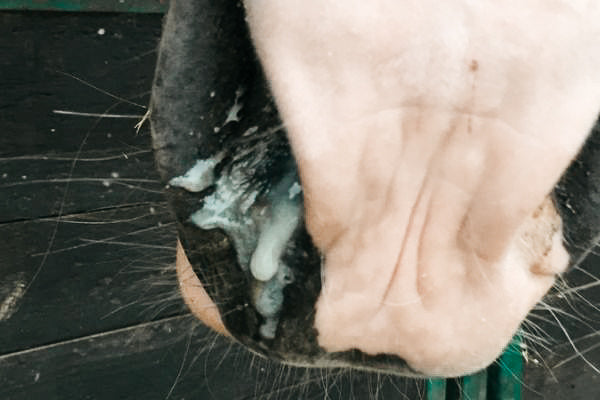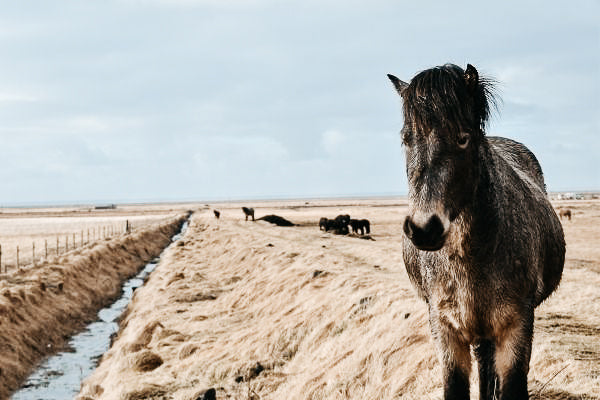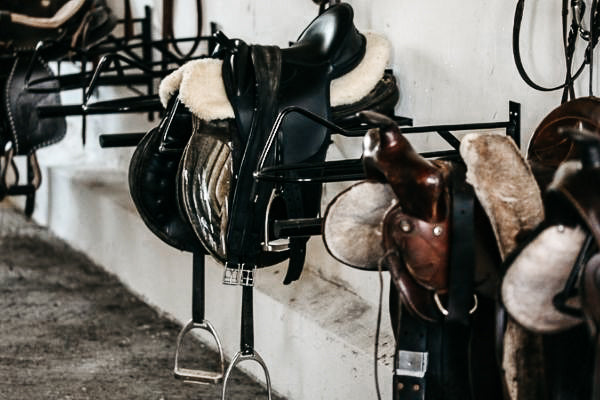
Respiratory diseases in horses – interesting facts
Healthy lung function is very important for the horse as an exercise animal. In fact, there are a lot of riding horses that are affected by respiratory diseases such as COPD or COB. Coughing in a horse should immediately set off alarm bells. Quick action is required here so that chronic bronchitis does not occur, which puts the animal out of action again and again.
We will show you the types of illness, offer tips and hopefully shed some light on the matter.
Respiratory diseases at a glance:
Current picture of COPD (Chronic obstructive pulmonary disease / COB (chronic obstructive bronchitis)
In most cases, COB in horses (formerly known as end-stage depression) is preceded by acute bronchitis. Caused by viruses or bacteria, horse cough takes a toll on the animal. Significant mucus is produced. The lungs' self-cleaning mechanism is no longer able to help itself. Expectorants have to go into the horse! The already irritated mucous membranes are very vulnerable in this condition. Further infections cannot be ruled out.
Horses kept in boxes/stables are more affected than those kept outdoors. Ammonia gases, dust and mold spores simply put more strain on the respiratory tract in closed rooms. Makes sense to you, right?
For a few years now, however, the terms COPD and COB have no longer been used in this way. The new names for the lung problem are: RAO (Recurrent airway obstruction) = recurring airway obstruction (chronic bronchitis) and IAD (Inflammatory airway disease) = inflammatory airway disease. You can equate RAO with the asthma of us humans. It is very allergen based as described above. Pollen can even be a trigger.
So don't forget: COPD in horses and COB in horses are actually RAO and you will now be able to find more about them on the internet.
What then distinguishes RAO and IAD from each other?
The causes of IAD are described as immunodeficiency, allergic processes and viral infections. Young horses are often affected. Horse cough occurs mainly during exercise and results in an enormous drop in performance. The animals can recover completely with appropriate treatment.
IAD symptoms:
- a reduction in performance is typical
- Nasal discharge is little to none at all
- Coughing on exertion
- the disease can also be accompanied by almost no symptoms
RAO is “more comprehensive”. The mucous membranes of affected horses swell significantly and coughing spasms attempt to get rid of the thick mucus that forms in abundance. Breathing is significantly more difficult. An increased breathing rate can be measured even when at rest. In IAD horses, breathing is usually normal at rest.
RAO symptoms:
- Nasal discharge
- regular, persistent cough (initially when exposed to stress or dust)
- high respiratory rate
- strong mucus production
- Flare your nostrils
- noticeable abdominal breathing, in severe cases steam trough visible
- Fever
- Loss of performance
Investigation into this:
First and foremost, the anamnesis is always the priority. You will be asked by the vet about the housing conditions, feeding and performance of your animal. This is followed by the clinical examination. Pulse, breathing, temperature and listening and tapping the lungs are the most important components.
An allergy test may be an option, as may a blood test (arterial blood gas analysis).
A bronchoscopy can/must be done if the horse's cough cannot be brought under control. The nature of the mucous membrane and the secretion formed are determined more precisely. The veterinarian can also take samples (which are examined in the laboratory) to better understand a possible lung disease (e.g. b chronic bronchitis) and how he needs to continue to treat it.
An x-ray or ultrasound may be necessary if the disease is difficult to determine.
Treatment procedure:
The veterinarian will first optimize the housing conditions. That means e.g. b a change from straw to a less dusty bedding and/or feeding steamed hay. Expectorants can be prescribed for horses, as well as medications that expand the airways or an antibiotic. In very stubborn cases, cortisone is used. Lung lavage is used less frequently.
He will certainly suggest that you inhale with a horse inhaler. Inhalation has proven to be very helpful in human medicine and quickly provides relief from respiratory diseases. This can be used to slow down chronic bronchitis. But it's not just the COPD horse that benefits from inhaling. The treatment is good for every “stable horse”. The device can often be borrowed. Smaller, manual devices can already be purchased from specialist retailers. Adding cough herbs helps horses breathe much more freely.
There is even brine therapy for horses. Maybe you've heard of it before? This is also offered on mobile devices. A specially converted horse trailer releases salty sea air towards the horse like a giant inhaler. So you don't have to spend a lot of time driving your hottie to the clinic. This can be done practically on site. That's inhaling on an impressive scale!
If your veterinarian has additional training in naturopathy, he can give the horse a start to self-healing with homeopathy if he has a slight cough or elicit the body's own powers with acupuncture and autologous blood treatment.
Of course, you can also consult a qualified animal health practitioner who will take a lot of time with your animal. If you have a COPD horse, this definitely makes sense. Cough horse homeopathy - if anyone knows what it is, it's him. The small beads can have a big impact, especially when it comes to respiratory diseases. In any case, animals respond well to globules.
This is how you can do a lot of good for your darling:
Every COB horse enjoys variety in the feeding trough. Cough herbs give horses an extra dose of natural strength and support. Thyme, anise, Icelandic moss and ribwort plantain e.g. b can be poured over with hot water and after approx. Simply add it to the concentrated feed ration for 20 minutes. They have an antispasmodic and expectorant effect and relieve chronic bronchitis. These herbs are also good for inhaling.
Similarly, a little black cumin oil cannot harm the horse even if there is the slightest sign of a cough. Black cumin oil provides horses with a boost of energy and immune defense, which they especially need during this time. Tip: Always choose a cold-pressed oil without any additives.
If your pet gets problems in the hall or on the field, it is better to let him run on a meadow (farmers ask beforehand!) or in the area for a few days. There is significantly less dust there and exercise in the fresh air is beneficial for recovery.
Perhaps you can find fellow sufferers in your environment who can help you with their experiences.
Discover more posts

Icelanders - the delicate dancers
It's hard to imagine today's equestrian sport without them - the handy little ones with the enchantingly fluffy mane and incomparable robustness. In this country they are affectionately called...
Continue reading
Saddle cabinets are available in different sizes and designs and, depending on the features, cost a lot of money. It is not uncommon for horse lovers to build or have their own cabinet made. D...
Continue reading
